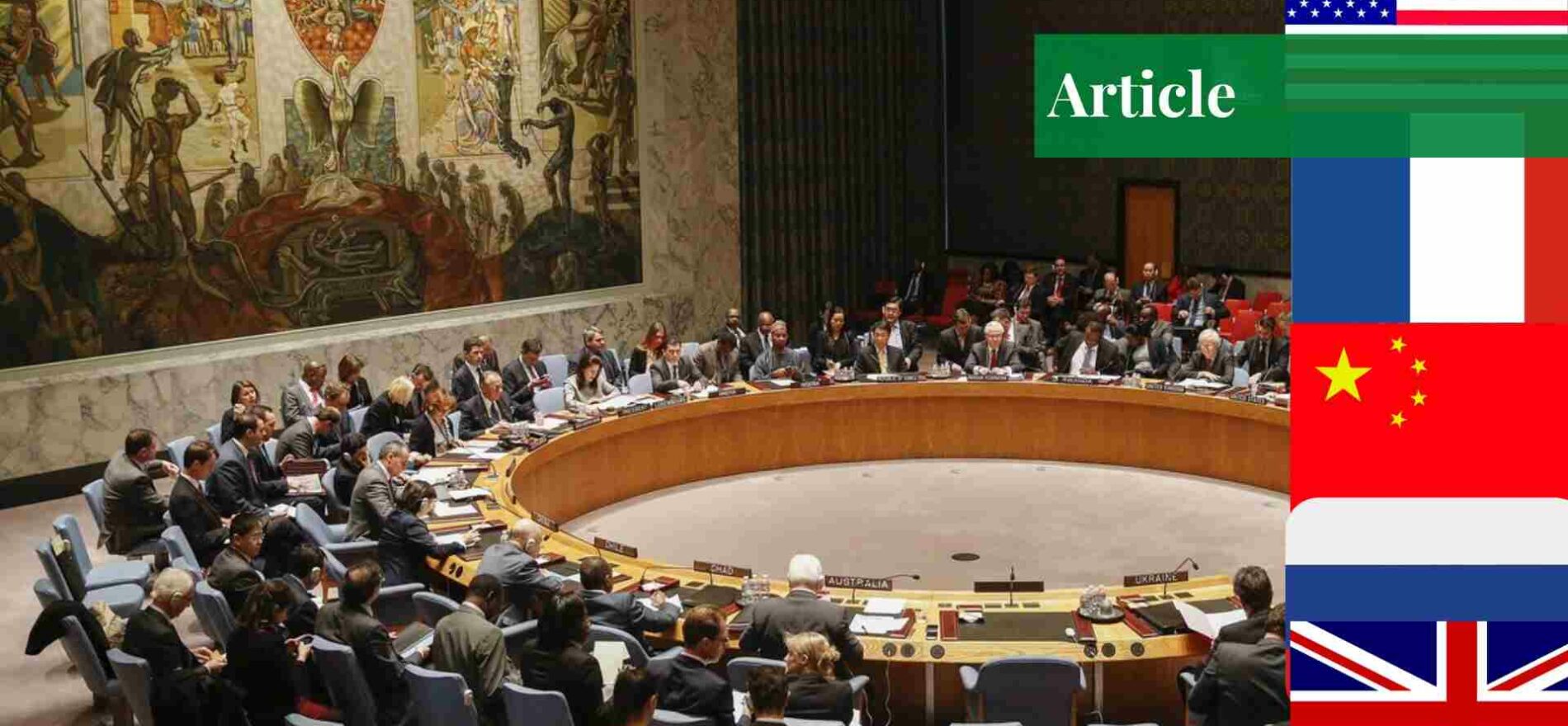Coloniality of the P5 in the UNSC
The end of colonial administrations was not the end of coloniality. While direct, overt colonisation may have diminished, the legacies of colonial structures, power dynamics, and their inherent inequalities persist through institutions like the United Nations’ Security Council (UNSC) which enables the hegemony of five countries over the world to perpetuate coloniality in the “post”-colonial world.
In the aftermath of WWII, five countries i.e., China, France, the Russian Federation, the United Kingdom, and the United States—four of which were former colonial powers, collaborated to establish the UNSC as a global governance institution to maintain international peace and security, prevent conflicts, and coordinate collective responses to ensure global stability.

From being members of the Allied forces in the WWII, they became the 5 permanent members of the UNSC that were granted the exclusive veto power. Initially conceived as a tool to maintain a balance of influence in the global arena and prevent unilateral actions, the veto power which enables any one of them to prevent the adoption of any “substantive” draft Council resolution, regardless of its level of international support, has now evolved into a mechanism that serves the interests of the powerful.
In this regard, the ability of the P5 to strategically cast a veto to advance their national interests and further their respective foreign policy objectives reflects the continuation of colonial practices in a more subtle and systemic manner.
Institutionalisation of the UNSC as the Hegemon of the P5
“Hegemony connotes the domination of the weak by the strong, the many by the few”, and “it implies the institutionalisation of privilege, consequent inequality in the distributions of various values, and the injustices inherent in inequality”. Puchala’s words stand true for the systemic institutionalisation of the United Nations’ Security Council as the hegemon of the P5 where the decisions and actions of these five members shape the international agenda.
Despite the geopolitical shifts and the emergence of colonies as independent nations after the WWII, the dearth of equitable representation of diverse global interests in the Council, the permanent status and veto power of the P5 within the UNSC became a mechanism through which the former colonial powers sustained their influence in the global affairs. This represents a continuum of hegemony that has transitioned from direct colonisation to a more nuanced and enduring form of coloniality and dominance in the international arena.
The UNSC, conceptualised as a forum for collective decision-making for international peace and security, has paradoxically become a stage where the strategic interests of a select few hold disproportionate influence.
The Council’s inability to prevent genocides, resolve long-standing conflicts, and address humanitarian crises stems primarily from the influence of the P5 countries on the Council’s decisions and resolutions—whether in maintaining alliances, imposing sanctions, selective intervention, or avoiding actions that could disrupt the geopolitical dynamics—which seek to protect the strategic interests of these five countries.
This compromises its ability to address conflicts impartially, maintain the credibility necessary for effective conflict resolution, and fulfil its mandate to maintain global peace and security.
Israeli Occupation (1948-Now)
The Israeli occupation of Palestine was sanctioned by the United Nations’ adoption of resolution 181, known as the Partition Plan, in 1947, that approved the division of the colonial British Mandate of Palestine into Arab and Jewish states. Since the establishment of Israel in 1948, its Zionist ideology and settler colonialism, supported by the Western world, particularly the United States, has resulted in Arab-Israeli wars, continued armed conflict, displacement, and ethnic cleansing of the indigenous Palestinian people. Today, Israel controls more than 85% of historic Palestine.
Ongoing Israeli attacks on Gaza since October 7 alone have killed around 24,000 Palestinian civilians, injured over 60,000 people, displaced more than 80% of Gaza’s 2.4 million population with no safe spaces left since the beginning of its ground offensive, rendered 1.5 million people homeless, reduced the entire city to rubble, and restricted the access of humanitarian aid and assistance to the Gaza strip.
As Israel continues the genocide and ethnic cleansing of the Palestinian people under the sham of combatting terrorist elements of Hamas, the world turns a blind eye to the woes of these innocent civilians as the global power corridors fail to even pass a resolution in the UNSC that calls for an immediate ceasefire between Israel and Hamas, release of all hostages, and delivery of humanitarian aid.
This failure of the UNSC to adopt a binding ceasefire resolution is primarily due to the veto vote casted by the United States. As of 18th December, the US has used its Security Council veto 45 times since 1945 to protect Israel from critical resolutions to protect its strategic alliance with Israel, pursue its foreign policy objectives, and sustain its influence in the international arena. The conflict that was created by colonisation is now being sustained by coloniality in the modern world.
Decolonising the UNSC
The imperative for the decolonisation of the United Nations’ Security Council necessitates a radical reconsideration of its structural framework. Subject matter experts such as Hannah Ryder, Anna Baisch, and Ovigwe Eguegu argue in favour of the abolition of the permanent membership status, making all 15 seats in the UNSC temporary and subject to re-election every five years to ensure continuity but also prevent prolonged dominance, ensuring non-regional open competition for each seat.
Moreover, they believe “veto-based decision-making on behalf of others, as the Security Council does, should be earned, and criteria for responsibility and capability transparently demonstrated and rewarded”. However, such an ambitious decolonisation of the UNSC cannot be realised as the P5 would not allow for reforms which could potentially jeopardise their powers and hegemony.
This persistence of coloniality within the structures of global governance, characterised by the power dynamics of the UNSC, serves as a stark reminder that the legacies of historical colonialism continue to shape and influence the contemporary landscape of international relations, deterring the pursuit of a truly egalitarian and inclusive international order.
If you want to submit your articles, research papers, and book reviews, please check the Submissions page.
The views and opinions expressed in this article/paper are the author’s own and do not necessarily reflect the editorial position of Paradigm Shift.



















